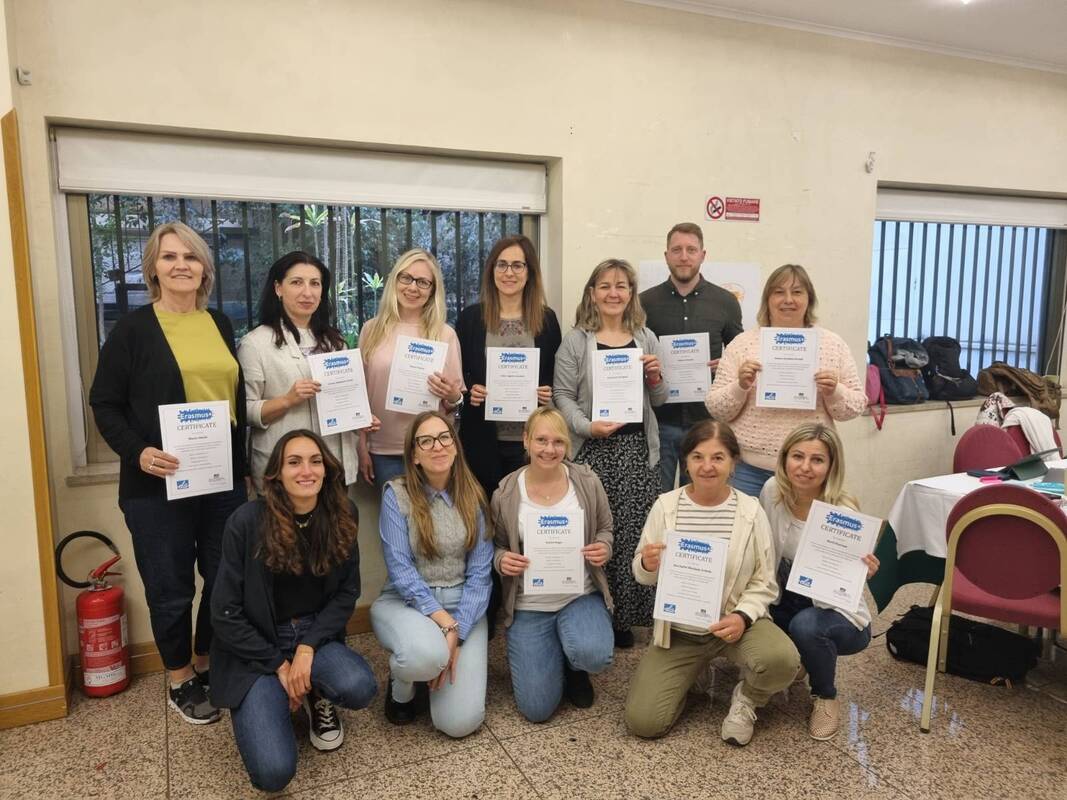|
Nowadays it is important to have a look at different kinds of non-formal teaching methods and strategies to discover their potentialities in enhancing education effectiveness. Thinking beyond the brick-and-mortar walls of the traditional classroom when it comes to learning and preventing early school leaving, non formal education is “any organised educational activity outside the established formal system – whether operating separately or as an important feature of some broader activity – that is intended to serve identifiable learning clienteles and learning objectives” (Philip Coombs, 1973). The new edition of the course “Non-Formal Education Teaching Methods and Strategies” took place in Palermo from 21/04/2024 to 27/04/2024. The participants came from all across Europe, with Annamarie Jerigová from Saint Nicholas Catholic School in Slovakia, Corina Anamaria David and Maria Chiuda from Centrul Scolar de Educatie Incluziva Nr. 1 in Romania, Fabian Schmitt and Eyleen Hager from TGBBZ 1 in Germany, Ainara Arzalluz Errasti, Ana Isabel Marijuan Artieda, Eider Agudo González from IES Xabier Zubiri Manteao BHI in Spain, and Noora Paquay and Kerli Paarson from Tallinn European School in Estonia. To begin with this week, the participants were asked to explore the differences between formal, informal, and non-formal education through various exercices. They shared their point of view about the characteristics of each of these types of education and debated together by using visual strategies through collages or drawing to stimulate their creativity. In a second time the participants shared their different experiences about non-formal education. We reviewed some possibilities to integrate the non-formal education in the classroom. For example, the creative thinking might be a way of assessment to help the students reflect on their mistakes, by having a guided reflection. We also made the use of digital tools in order to create interactive lessons to catch the attention of the students. Another day was dedicated to team building and team working. A few activities were organized with the participants to apply what they learned about group cooperation. The activities aimed to implement learning, notably through role game. Collaboration is important inside a team to be more productive and give each of the members the possibility to bring its own contribution. Engaging in debate and speaking games represents a form of non-formal education, serving to promote cooperative learning and foster a dialectical approach. The Jigsaw Method guided the participants to have a collaborative spirit in their cooperation process, by practicing experimentation and kindness. After collectively examining various tools and strategies in non-formal education, each participant gained the autonomy to create a new tool suited to their unique school setting. Through the collective creativity and dedication of all involved, the course resulted in a collection of inventive and useful teaching resources crafted by the participating educators.
In summary, across these sessions, participants were able to explore inventive techniques within a nurturing and dynamic atmosphere, refining abilities like teamwork, empathy, and critical thinking. Moreover, they seized the opportunity to craft original and unique non-formal tools and learned from each other. Discover more about this course here. |
Welcome to the ELA Blog. Here you will find articles and photos of our courses and have a look at the topics addressed during the week in Bologna, Palermo and Tenerife. You will also have the chance to take a peek at our projects and check out what we have been up to.
Archives
July 2024
Categories |
-
Course catalogue
- 2023-2024 course catalogue
- Soft Skills >
- ICT and New Technologies >
- Inclusion and Diversity >
-
Innovative Teaching Methods
>
- Innovative teaching methods discovery
- Non-formal education teaching methods
- Dual education and work-based learning
- Teaching leadership and entrepreneurship
- Project based learning
- Game based learning and gamification
- Green skills
- Outdoor education
- Outdoor education trekking edition
- Promoting creativity and critical thinking
- Languages and EU projects >
- Preschool >
- Erasmus Plus KA1
- What we do
- About us
- Locations
- Blog
- Contact us
 English
English български
български Čeština
Čeština Español
Español Français
Français ελληνικά
ελληνικά Italiano
Italiano Polski
Polski Português
Português Română
Română




 RSS Feed
RSS Feed









